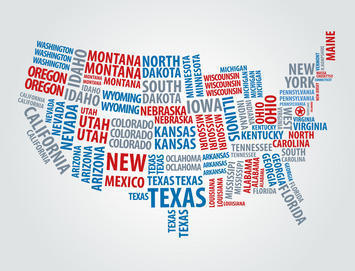
In this highly polarized political environment, states and localities, are ever more taking on the character of separate countries. Washington’s gridlock is increasingly matched by decisive, often “go it alone” polices from local authorities. Rather than create a brave, increasingly federalized second New Deal, the Obama years, particularly since the Republicans took control of the House in 2010, have seen discord rise to a level more akin to that left by James Buchanan, the last president before the Civil War, than Franklin Roosevelt.
This makes understanding the sometimes-divergent economic and demographic trends of various states ever more important. With no compelling national vision, not only are politics more “local” but are increasingly distinct by region.
The Main Event: Texas vs. California
Today’s two leading economic models come, not surprisingly, from our two megastates, California and Texas. For its part, the Lone Star State follows a traditional American growth model, spread among a wide array of industries, notably energy, and prodded by population growth.
Read the entire piece at The Orange County Register.
Joel Kotkin is executive editor of NewGeography.com and Roger Hobbs Distinguished Fellow in Urban Studies at Chapman University, and a member of the editorial board of the Orange County Register. He is also executive director of the Houston-based Center for Opportunity Urbanism. His newest book, The New Class Conflict is now available at Amazon and Telos Press. He is also author of The City: A Global History and The Next Hundred Million: America in 2050. He lives in Los Angeles, CA.
Wendell Cox is principal of Demographia, an international public policy and demographics firm. He is co-author of the "Demographia International Housing Affordability Survey" and author of "Demographia World Urban Areas" and "War on the Dream: How Anti-Sprawl Policy Threatens the Quality of Life." He was appointed to three terms on the Los Angeles County Transportation Commission, where he served with the leading city and county leadership as the only non-elected member. He was appointed to the Amtrak Reform Council to fill the unexpired term of Governor Christine Todd Whitman and has served as a visiting professor at the Conservatoire National des Arts et Metiers, a national university in Paris.
USA map image by BigStockPhoto.













With no compelling national
With no compelling national vision , thank post , very good
m88
I wonder how much the advent
I wonder how much the advent of air-conditioning has had to do with the growing popularity of the deep South? Even in the mid-sized (once) industrial city of Chattanooga, where I live, which is on the Georgia border, it is hard to imagine putting up with the summer heat and humidity without air-conditioning unless you are fortunate enough to live on one of the nearby mountains.
In any event the migration from other parts of the country is striking. And not only from points up North but from places like Colorado and California too. Furthermore, our upper-middle-class young people, who use to leave with regularity upon graduating from high school, now come back after college, realizing what a sweet deal it is compared to just about anywhere else in America.
Our Coca-Cola bottling magnates poured a couple of billion dollars into development of the downtown riverfront, which made an enormous difference. And one of the local foundations offered $15,000 bounties to artists who would move here and stay for a minimum period of two years (I think it was). Even before Chattanooga was something of a mecca for painters, always searching out the cheapest, most esthetically pleasing places to live. Did I mention Chattanooga is probably the most beautiful inland city in America in terms of its setting?
Then too Kayakers, spelunkers, hang-gliderers, bicyclist, rowing enthusiasts, rock climbers, hikers, and nature lovers in general moving here have made Chattanooga a kind of Boulder of the South, at one-third the price.
But of course all is not hunky-dory. We have poor public schools. In fact cynics sometimes say that if Chattanooga didn't have such bad public schools it would be the end of everything we like about the place: people would move here in droves from all over the country, real estate prices would sky-rocket, and we would become much more like Nashville or Atlanta. Not that they have such great public schools, but they have other things going for them.
Luke Lea
Gilded Age Politics
I respectfully disagree with the author's assertion that the nearest parallel to today's gridlock occurred during the Buchanan administration.
The Gilded Age experienced decades of gridlock. The Republicans controlled the executive branch and the Senate while Democrats dominated the House. The 1880's and 1890's saw few legislative compromises and the grass roots progressive movement broke out in the states and municipalities as a result. Exactly the type of state activism the author points out in the article.